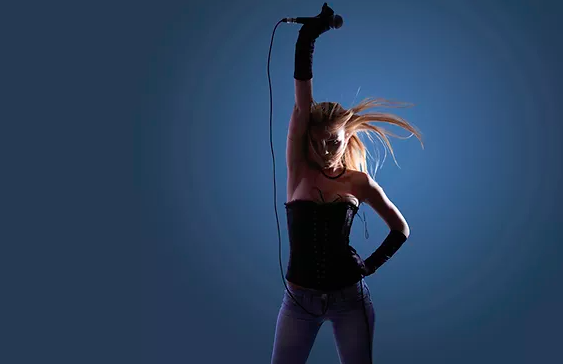Silence The Shame
By Jenna Pastuszek
I am a voice teacher, and I had a vocal injury. It took me three months to write that sentence down on paper and nine months to publish this piece.
I felt embarrassed. I felt shame. I felt like an imposter. How can I be teaching others how to use their instruments properly if I myself got an injury? Why should anyone pay me to help them if I can’t even help myself? Why would anyone want to hire a “weak singer” to teach them how to be a strong one?
In March 2019, I had a vocal fold hemorrhage. Vocal hemorrhages can be caused by anything from over singing to too much coughing or aggressive sneezing or tweaking something during a workout. Once the hemorrhage was discovered, I was told to STOP EVERYTHING and go on immediate vocal rest. Suddenly, in the forced silence, it hit me. I realized that every job I have, every way I make money to live, is reliant on my ability to speak. Without my two tiny folds of skin flapping along in the wind, I quickly realized, I am worthless.
So, I did the only thing I could do to save my most prized possession: I removed as many vocal commitments as possible from my calendar and forced myself to rest. I spent my birthday on the couch alone with my nebulizer.
A return trip to the ENT the following week showed that the hemorrhage had healed, yet another other issue persisted: a polyp on my right vocal fold that, perhaps, was being fed by the hemorrhaging blood vessel. It was soft and pliable, not hard like scar tissue, and I was told that it’s placement in the center of my vocal fold was a very typical place for polyps like this to occur in musical theatre belters. The polyp could’ve developed in my childhood, when I first began singing at 11 years old, or it could have developed in college or after grad school. The timeline didn’t really matter. All I heard the doctor say was that it would never go away on its own- it would stay as is or continue to get worse.
Desperate for anything to Save my Vocal Ship, I hoped that a change in diet would reduce extra inflammation. I thought, maybe if my throat was less inflamed, my polyp would decrease in size. I might be able to sing again without the anxiety and the fear I had come to know over the past few weeks. I gave up alcohol. I went 64 days without a glass of wine or a swig of beer. I gave up sugar. I went 32 days without a cookie, a starburst, or a drop of honey in my tea. I committed to a strict monk like regiment of self-care involving yoga, Pilates, a gluten-free, dairy-free, Low FODMAP diet, eight hours a night of sleep, and steaming every day.
...And it sort of worked! A month later, my ENT reported that the polyp had definitely downsized, but, unfortunately, was still there.
So there I stood, facing a major decision. Do I have vocal surgery? Do I become someone who now identifies as a vocal surgery survivor? Or do I continue on, business as usual, knowing that my singing days are numbered? Do I continue worrying about being at a loud bar or restaurant, feeling panic every time a friend invites me to a party? Do I continue on for the rest of my life having to create a daily schedule around my vocal usage leaving plenty of room for vocal naps and lengthy warm ups and eliminating eating after a show and talking to cast mates in the green room? Do I rethink how I make money altogether and find a job that doesn’t require me to speak? Do I give up my love of teaching or my love of performing and become a Muggle? Or do I risk the worst case scenario of not having the surgery and then finally booking my “big break” only to realize halfway through rehearsals that I can’t physically do it?
During my career, I’ve met hundreds of actors from around the country and around the world, and the one conversation I’ve noticed that never comes up is anything pertaining to vocal injury. It feels like this taboo topic- like finding a speakeasy during Prohibition. Unless you know the password, it’s hard to find the right people to reach out to when you’re weighing your options and just want to talk to someone who’s gone through it and emerged singing on the other side.
Why is there such a stigma against vocal injuries in the performing community? Why are they encouraged to be kept a secret and looked at as this demoralizing thing that you should feel shame about? What if we changed the rhetoric surrounding these injuries and came together to support each other instead?
What if we acknowledged that we are truly VOCAL ATHLETES, and athletes get injured? And when it happens, fans are bummed because they won’t be there to score any more touchdowns this season, but all they talk about are how excited they are to see the person back on their feet and back on the playing field next year. If you look at headlines reporting sports injuries or listen to sports radio discussing them, you notice that there’s a sense of support and empathetic caring that goes along with professional athletes getting hurt doing their jobs. Whereas a quick Google search for injured singers results in critical headlines blaming the singer. There’s a sense of shame, a look of pity, and an unspoken worry about working with someone “damaged”.
This experience has taught me more about myself than any other time in my career. Almost six- months post-surgery, I am now more confident than ever in my voice and its abilities. I am openly sharing that I had an injury because I don’t want this stigma to exist anymore, and perhaps the more we talk about it, the more understood it will become. It’s enough emotionally to be injured in the first place besides feeling alone, depressed, and scared about what other people might think of you because of said injury.
I was injured. I am not broken. And because I’m a voice teacher, I am equipped to overcome an injury and use my technique to get me back into the vocal shape in which I thrive. Because of my injury, I have become a better teacher, as I am now able to relate to and to help my clients cope with their own injuries and anxieties. And because of my injury, I’ll be a more empathetic actor, relating to other actors and characters going through the shames and fears surrounding injury.
Vocal athletes are at risk to hurt themselves, just like any other sports professional. They need to feel safe and supported so that they can seek proper treatment and care. With shame comes silence. With silence comes inaction. With inaction comes a relentless cycle of instability and anxiety. And with anxiety, your ability to perform your job at the highest level possible, is impossible.
Let’s work together to shift the narrative and support our injured teammates. Let’s work together to get them back on the field in one mental, physical, and vocal piece.

